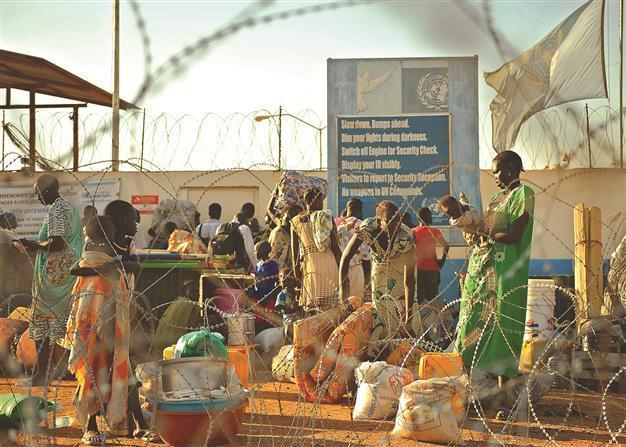World steps up warnings on strife-torn South Sudan
JUBA - Agence France-Presse

Residents of Juba arrive at the UN compound where they sought shelter. Fighting has been raging in S Sudan for a week, after President Kiir accused his former deputy Machar of attempting a coup. AFP photo
World leaders stepped up efforts Dec. 22 to pull South Sudan back from the brink of all-out civil war, as fighting raged across the country including in a key oil-producing region.
Special envoys from the United States and Nigeria were flying into the capital Juba, following on from a mission by foreign ministers from east Africa and the Horn and after an appeal for an end to the violence from United Nations chief Ban Ki-moon.
“I demand that all political, military and militia leaders stop hostilities and end the violence against the civilians,” Ban told a news briefing on a visit to the Philippines.
Fighting has been raging in South Sudan for a week, after President Salva Kiir accused his former deputy Riek Machar of attempting a coup. Machar has denied this, and has accused Kiir of carrying out a vicious purge of his rivals.
The fighting has left hundreds dead and sent tens of thousands of people fleeing for protection in U.N. bases or to safer areas of the country, which only won independence from Sudan in 2011 but has been blighted by ethnic divisions, corruption and poverty. The fighting has both ethnic and political dimensions, as troops loyal to Kiir, an ethnic Dinka, battle forces backing Machar, a Nuer.
Obama warnsForeign governments, including those of the U.S., Britain, Uganda and Kenya, have been organizing special evacuation flights to pull out their nationals. On Dec. 21 four U.S. servicemen were wounded when their planes were fired at in a rebel-held area.
The attack underlined the increasingly dangerous situation in South Sudan, where at least one U.N. base has also come under attack in recent days, with the deaths of two Indian peacekeepers and possibly dozens of civilians. President Barack Obama warned against continued fighting.
“Any effort to seize power through the use of military force will result in the end of longstanding support from the United States and the international community,” the White House said.
South Sudan’s government meanwhile acknowledged that much of Unity State, the country’s main oil-producing area, was in the hands of the rebels.
Forces loyal to Machar were also still in control of Bor, the capital of Jonglei state and situated about 200 kilometers north of Juba, although South Sudan’s army spokesman said government troops were advancing.
Oil production accounts for more than 95 percent of the country’s fledgling economy, and the sector has been hit with oil companies also flying out their employees after the death of at least five South Sudanese oil workers last week.
Juba’s ambassador to Khartoum, however, insisted Dec. 22 that oil facilities had not been damaged and oil was still flowing. Tens of thousands of South Sudanese have fled their homes, many seeking shelter at U.N. bases amid warnings the impoverished nation was on the brink of all-out civil war.
